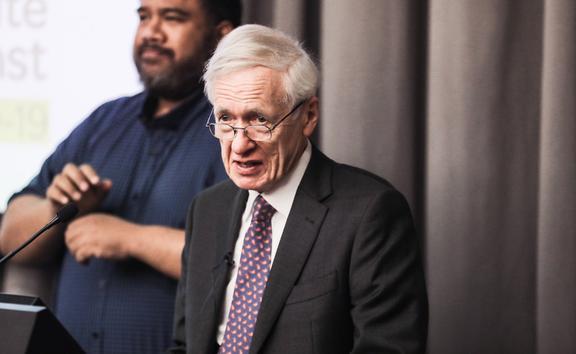Border restrictions to ease this week
RNZ
28 February 2022, 4:00 PM

From 11.59pm tomorrow, vaccinated travellers will no longer need to isolate and vaccinated New Zealanders travelling from beyond Australia will be allowed to return from this Friday, also without having to self-isolate.
Prime Minister Jacinda Ardern told told Morning Report yesterday that the latest advice to the Government from epidemiologist Sir David Skegg and his team, who have been advising the Government on how to safely re-open the border, had been received.
She said when the Government set out its plan, it noted that as case numbers increased, the impact of cases at the border would be less pronounced.
The strong advice of public officials at that time was that isolation was still needed for people entering the border, but there was a not too distant future where that would not be the case.
Ardern said advice from the group taking another look at those settings was presented at 4pm on Sunday.
The advice was released yesterday afternoon, which Prof Skegg outlined.
He said the MIQ system had been "a crucial factor in New Zealand's remarkable success so far in responding to Covid-19", but in weeks the pattern of risk had changed.
He said given the rapid change in risks posed, the group now believed it was appropriate to drop requirements for self-isolation for fully vaccinated travellers - both returning New Zealanders and tourists when borders are opened more generally.
Professor Skegg said arriving travellers should be tested within 24 hours of arrival and those who return a positive test should be managed in the same way as other Covid-19 cases.
"We recommend that whole genome sequencing should be carried out in those cases as a surveillance tool to detect the arrival of new variants of the virus.
"I think it's also important for us all to remember that this pandemic is not over, or nearly over.
"The virus continues to mutate and personally I would be surprised if we're still talking about Omicron at the end of the year."

Sir David Skegg
Ardern said based on the group's advice, Cabinet had agreed vaccinated travellers entering New Zealand would no longer need to self-isolate from 11.59pm on Wednesday.
She said the decision was balanced with other factors - borders were still gradually reopening and the Government's staged reopening plan would remain in place to help stagger the impact on the current outbreak.
Every traveller will still be required to undertake a rapid antigen test (RAT) within the first 24 hours after arriving, and on day five or six after arrival.
Unlike others who test positive in the community, positive rapid antigen tests will need to get a further PCR test to confirm, and monitor new variants through genome sequencing.
All incoming travellers will also still be required to undertake a predeparture test.
Unvaccinated travellers will still need to enter MIQ.
Ardern said MIQ would still remain a useful tool even if it was not used to the same extent as it was in the past.
She said step two of the Government's reopening plan - allowing New Zealanders and other eligible critical workers from the rest of the world - will also begin earlier than previously planned, from 11.59pm this Friday.
Due to immigration processes, other non-New Zealanders who are part of step two of the Government's reopening plan, such as working holiday visa holders and RSE workers, will still be eligible to arrive from March 13, but will not have to self-isolate.
When asked when New Zealand would open to tourists, Deputy Prime Minister Grant Robertson told Checkpoint he was confident the border would fully reopen "in the next few months".
"You would have heard from the prime minister Covid doesn't work to timelines and dates and calendars as we'd like it to, but what we're signalling is as we come off that peak, as we move through March into April, we can then start to take decisions, based on where we're at with the health system and so on, and it will be much sooner I think than people have expected . . . to be able to see people coming into New Zealand freely from everywhere."



